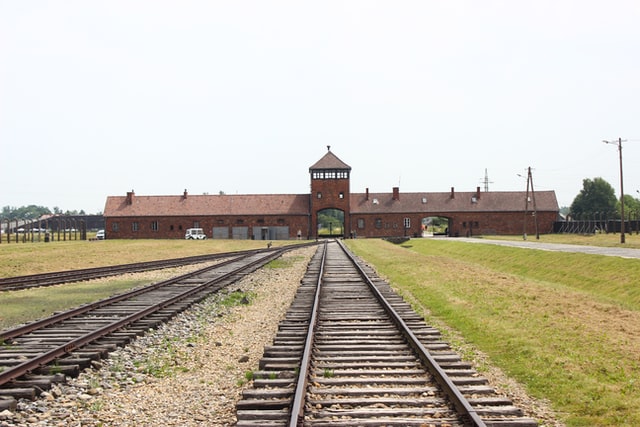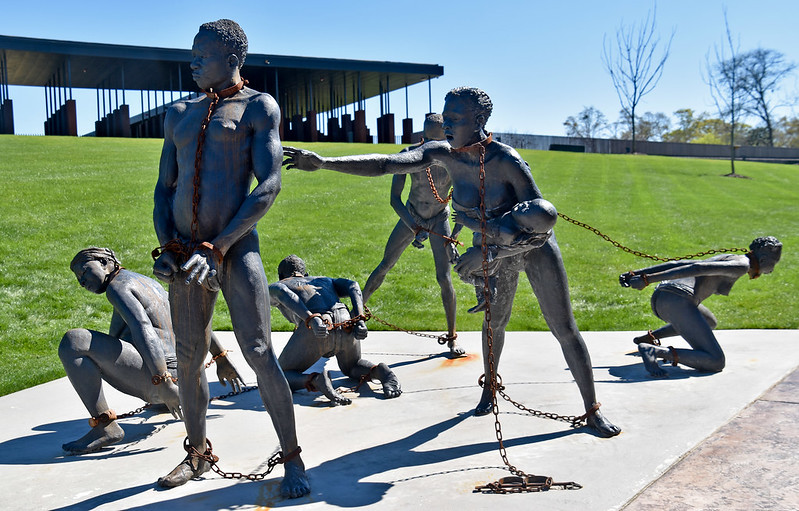A proposed Florida law prohibits any teacher in the state from providing information about the full brutality of our country’s history of black chattel slavery, Jim Crow apartheid that followed along with serial atrocities including the terrorism of lynching, and the legacy of this in contemporary institutionalized racial bias. The official reason, right there in the text of the law, is because awareness of our authentic history might cause some individuals to “feel discomfort, guilt, anguish, or any other form of psychological distress on account of his or her race, color, sex, or national origin”.
There is another way.
Two years ago my wife and I undertook a pilgrimage to Auschwitz/Birkenau organized and led by the Zen Peacemakers. We stayed for a week at a retreat center by the gates of the camps and every day and most evenings we visited the wretched barracks, dungeons and torture chambers, gas chambers, crematoria, and museums of horrifying memorabilia. We sat in meditation and prayer on the railroad platform where the cattle cars unloaded their traumatized prisoners, most doomed to die here.

Our fellow retreatants came from many countries including the USA, Israel, and Germany.
I am Jewish. My father migrated from the pale of settlement in eastern Europe in the early 20th century, as did my mother’s parents. Countless relatives of mine who could not leave were annihilated a generation later in the holocaust.
Every day on our Auschwitz pilgrimage we would gather in small groups and share whatever was moving through our hearts and minds as we participated in this emotionally upheaving confrontation with the industrial scale Nazi atrocities. Naturally, I identified with the victims and was immersed in feeling the suffering of those who may have been members of my own extended family. Our German companions were confronting the participation, complicity, or at least silence in the face of mass brutality of their forbearers.
I was humbled by their courage and humility, their willingness to face what their own parents and grandparents had wrought. This they felt compelled to do as part of their own healing journey. The way to fulfillment of their own humanity lay along the path of remembrance into the heart of understanding.
They did not view themselves in a negative light any more than the Jews among us viewed them that way. On the contrary, their openness and humility provided the gift of seeing one another as fellow humans on a shared journey towards healing which denial only ever suppresses. And what is suppressed does not vanish. It festers subconsciously and provokes attitude and behavior in the darkly shadowed corners of our being. Feelings of discomfort, guilt, anguish or any other form of psychological distress can be doorways into the corridors of healing if we walk through and see what they conceal.
We all knew that there is still plenty of anti-Semitism in contemporary Germany, in Poland where Auschwitz is situated, and in many other countries controlled by the Reich during the war. In order to effectively confront this it must, to begin with, not be denied.
These German men and women have the strength that those who oppose the teaching of the full story of our own country’s history of racial oppression fear Americans do not have.
Upon returning from Auschwitz we journeyed to some of the sites of the most confronting civil rights struggles in the American south in the cities of Montgomery, Birmingham, and Selma, Alabama where the legacy of genocidal white supremacy and the struggles against it are vivid.
We contemplated how likely it is, had we been living as whites in those cities in the 1960s, that we would have been brave enough to join the Freedom Riders and other activists for justice and equality. After all, Rev. Dr. Martin Luther King, jr.’s iconic letter from his Birmingham jail cell was written to the white clergy, including the rabbis, who did not support what he was doing.
In Auschwitz, identifying with the victims, we bore witness to the holocaust. In Alabama, we were now confronting the atrocity of violent racism from the vantage point of the oppressors. We share our humanity with both the perpetrators and victims of all atrocities. This realization is crucial to the healing of our own hearts and the cultivation of compassionate action in our present lives.
Displaying the swastika is prohibited in Germany, but not here. And the Confederate battle flag is boldly flown all over this country and was carried into the Capitol on January 6, 2021. On that dreadful occasion, one participant wore a shirt with the message “Camp Auschwitz”.
There has never been a full reckoning with the racism that is woven into the fabric of our nation. And many are determined that there must never be. Clear-eyed witnessing, the first step towards healing, is to be banned in Florida and elsewhere by those determined to sustain the power and privilege that come from living inside self-aggrandizing cultural stories that also sustain the oppression of others whose stories are suppressed.
Hiding our history makes us weaker, not stronger. Confronting difficult feelings can bring us healing and wholeness, and bring us together.
But only, of course, if this is what we want.
